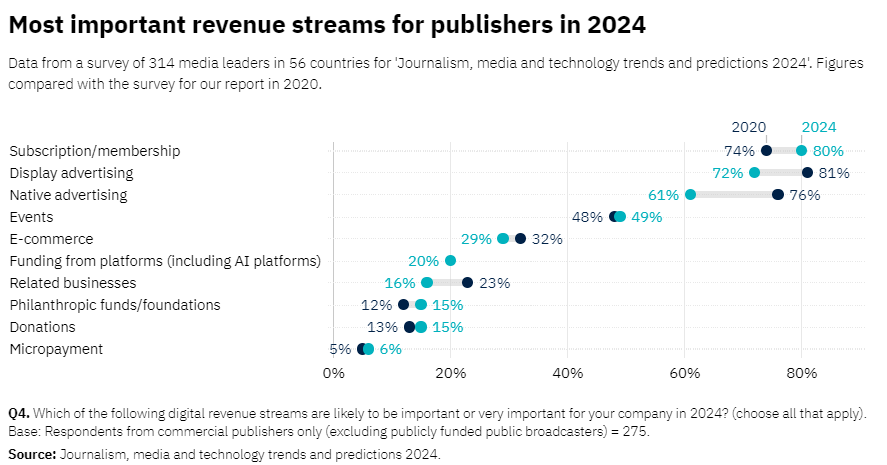When Reuters Institute for the Study of Journalism released its annual “Journalism, Media, and Technology Trends and Predictions” last January, Senior Research Associate Nic Newman commented that news organizations that hadn’t yet embraced digital would be at a “severe disadvantage,” highlighting one emerging technology that could offer “the chance for publishers (finally) to deliver more personal information and formats, to help deal with channel fragmentation and information overload.”
That technology was AI, and Newman’s prescient forewarning to “buckle up for the ride” seems almost cute considering how 2023 unfolded.
For 2024, the report begins with a much-more direct, dire warning about how the ride might look in the year ahead.
“The disruptive power of artificial intelligence will sweep through the information space this year at a time of intense political and economic volatility around the world,” Newman writes. “The implications for the reliability of information, and the sustainability of the mainstream media are likely to be profound in a year that sees critical elections due in more than 40 democracies, with wars continuing to rage in Europe and the Middle East. Against that background — and with one forecast suggesting that the vast majority of all internet content will be synthetically produced by 2026 — journalists and news organizations will need to rethink their role and purpose with some urgency.”
Almost half (47%) of the media leaders surveyed this year said they were confident about journalism’s prospects in 2024, with the boost of consumption and interest that comes with elections being one reason for hope, according to Reuters. Only 12% have low confidence, citing rising costs, declining ad revenue, and slower subscription growth.
The Reuters research highlighted Search Generative Experience (SGE) as part of the information distribution that’s “set for a major upheaval,” with 63% of respondents worried about the decline in referral traffic from social media sites like Facebook and X/Twitter. Newman writes that these changes would likely “further reduce audience flows to established news sites and put even more pressure on the bottom line,” a sentiment likely shared by the 77% who said they would be focusing more on their direct channels (such as websites, apps, newsletters, and podcasts) and the 22% who would be cutting costs.
“In their optimistic moments, publishers look forward to an era where they might break their dependence on a few giant tech platforms and build closer direct relationships with loyal customers,” writes Newman, who adds that media owners could in turn “build more barriers” to their content and IP.

(Source: Reuters Institute for the Study of Journalism)
80% of publishers said subscriptions remain their most important revenue focus, followed by display advertising (72%) and native advertising (61%).
“Expect to see a significant shift towards bundling of digital news and non-news content as large publishers look to lock in existing customers,” Newman writes. “All access subscriptions will include games, podcasts, magazines, books, and even content from other publishers.”
As for generative AI, 56% of publishers said it was “very important” for back-end news automation tasks “such as transcription and copyediting,” with other AI uses like recommendation offering (37%), content creation with human oversight (28%), commercial uses (27%), and coding and product development (25%) filling out the Top 5.
“Back-end automation has become much more important over time,” Newman points out, comparing this year’s 56% to the mere 29% who just two years ago said such back-end applications of AI were very important. “This extra focus is partly because large language models (LLMs) that have emerged since then offer so many new opportunities to speed up and optimize routine tasks in the newsroom.”
SEE FOR YOURSELF
The Magazine Manager is a web-based CRM solution designed to help digital and print publishers manage sales, production, and marketing in a centralized platform.




